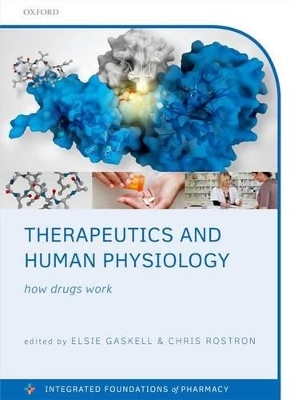
Therapeutics and Human Physiology
Oxford University Press (Verlag)
978-0-19-965529-8 (ISBN)
Taking medication is a common occurrence for many people, whether it is to soothe an aching head, regulate blood sugars, or to treat life threatening conditions, such as HIV or cancer. In the UK alone, over 900 million prescriptions are dispensed every year. Overseeing all of this are pharmacists: experts in medicines and their use.
The Integrated Foundations of Pharmacy series supports those who are at the beginning of their journey to become a pharmacist. The reader will begin to understand how a drug molecule is made; the process that turns it into a medicine; the role the pharmacist has when dispensing that medicine; and what happens in the body when it is taken. Most importantly, the series shows how each of these aspects are integrated, reflecting the most up-to-date teaching practices.
Therapeutics and Human Physiology: how medicines work introduces the range of physiological processes occurring in the different body systems, and shows how they respond to drugs that are administered.
Online Resource Centre
The Online Resource Centre to accompany Therapeutics and Human Physiology: how medicines work features:
For registered adopters of the book:
- Figures from the book, available to download.
For students:
- Self-assessment questions to help the reader to check and reinforce understanding of the material introduced in each chapter.
Dr Elsie Gaskell (editor), studied Applied Microbiology at Liverpool John Moores University. She worked at Pfizer in Sandwich, in their Veterinary Medicine research and development department, before undertaking a research degree. She completed her PhD in 2006, working in the area of novel therapeutic systems for cystic fibrosis. She is now a senior lecturer in the School of Pharmacy and Biomolecular Sciences at Liverpool John Moores University, where she teaches in the area of pharmacology. Her research interests remain in drug action and delivery. Dr Chris Rostron (series editor), graduated in Pharmacy from Manchester University and completed a PhD in Medicinal Chemistry at Aston University. He gained Chartered Chemist status in 1975. After a period of post-doctoral research he was appointed as a lecturer in Medicinal Chemistry at Liverpool Polytechnic. He is now an Honorary Research Fellow in the School of Pharmacy and Biomolecular Sciences at Liverpool John Moores University. He was a member of the Academic Pharmacy Group Committee of the Royal Pharmaceutical Society of Great Britain and chairman for the past 5 years. He is currently chairman of the Academic Pharmacy Forum and deputy chair of the Education Expert Advisory Panel of the Royal Pharmaceutical Society. He is an external examiner in Medicinal Chemistry at a number of Schools of Pharmacy both in the UK and abroad. In 2008 he was awarded honorary membership of the Royal Pharmaceutical Society of Great Britain for services to Pharmacy education.
1. The scientific basis of therapeutics ; 2. Molecular cell biology ; 3. The biochemistry of cells ; 4. Introduction to drug action ; 5. Communication systems in the body - neural ; 6. The autonomic nervous system ; 7. Communication systems in the body - autocoids and hormones ; 8. Homeostasis ; 9. Haematology ; 10. This is just the beginning
| Erscheint lt. Verlag | 14.2.2013 |
|---|---|
| Reihe/Serie | Integrated Foundations Of Pharmacy |
| Mitarbeit |
Herausgeber (Serie): CHRIS ROSTRON |
| Zusatzinfo | Over 80 colour line drawings |
| Verlagsort | Oxford |
| Sprache | englisch |
| Maße | 196 x 264 mm |
| Gewicht | 496 g |
| Themenwelt | Medizin / Pharmazie ► Medizinische Fachgebiete ► Pharmakologie / Pharmakotherapie |
| Medizin / Pharmazie ► Pflege | |
| Medizin / Pharmazie ► Pharmazie ► PTA / PKA | |
| Studium ► 1. Studienabschnitt (Vorklinik) ► Physiologie | |
| Naturwissenschaften ► Biologie ► Humanbiologie | |
| ISBN-10 | 0-19-965529-4 / 0199655294 |
| ISBN-13 | 978-0-19-965529-8 / 9780199655298 |
| Zustand | Neuware |
| Haben Sie eine Frage zum Produkt? |
aus dem Bereich


